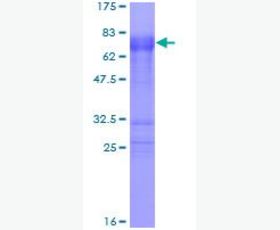Recombinant Human β,β-Carotene 15,15'-Monooxygenase/BCMO1/BCDO1
| Product name: | Recombinant Human β,β-Carotene 15,15'-Monooxygenase/BCMO1/BCDO1 |
| Source: | Human Cells |
| Purity: | Greater than 95% as determined by reducing SDS-PAGE. |
| Buffer Formulation: | Lyophilized from a 0.2 μm filtered solution of 50mM Tris HCl,10mM reduced Glutathione,pH8.0. |
| Applications: | Applications:SDS-PAGE; WB; ELISA; IP. |
| Storage: | Avoid repeated freeze/thaw cycles. Store at 2-8 oC for one month. Aliquot and store at -80 oC for 12 months. |
| UOM: | 100ug/50ug/200ug/1mg/1g |
| Source | Human Cells |
| Description | Recombinant Human beta-Carotene Dioxygenase 1 is produced by our Mammalian expression system and the target gene encoding Met1-Thr547 is expressed with a 6His tag at the C-terminus. |
| Names | Beta,Beta-Carotene 15,15'-Monooxygenase, Beta-Carotene Dioxygenase 1, BCMO1, BCDO, BCDO1 |
| Accession # | Q9HAY6 |
| Formulation | Lyophilized from a 0.2 μm filtered solution of 50mM Tris HCl,10mM reduced Glutathione,pH8.0. |
| Shipping |
The product is shipped at ambient temperature. |
| Reconstitution |
Always centrifuge tubes before opening. Do not mix by vortex or pipetting. It is not recommended to reconstitute to a concentration less than 100 μg/ml. Dissolve the lyophilized protein in ddH2O. Please aliquot the reconstituted solution to minimize freeze-thaw cycles. |
| Storage |
Lyophilized protein should be stored at < -20°C, though stable at room temperature for 3 weeks. Reconstituted protein solution can be stored at 4-7°C for 2-7 days. Aliquots of reconstituted samples are stable at < -20°C for 3 months. |
| Purity |
Greater than 95% as determined by reducing SDS-PAGE. |
| Endotoxin | Less than 0.1 ng/µg (1 IEU/µg) as determined by LAL test. |
| Amino Acid Sequence |
MDIIFGRNRKEQLEPVRAKVTGKIPAWLQGTLLRNGPGMHTVGESRYNHWFDGLALLHSFTIRDG EVYYRSKYLRSDTYNTNIEANRIVVSEFGTMAYPDPCKNIFSKAFSYLSHTIPDFTDNCLINIMK CGEDFYATSETNYIRKINPQTLETLEKVDYRKYVAVNLATSHPHYDEAGNVLNMGTSIVEKGKTK YVIFKIPATVPEGKKQGKSPWKHTEVFCSIPSRSLLSPSYYHSFGVTENYVIFLEQPFRLDILKM ATAYIRSMSWASCLAFHREEKTYIHIIDQRTRQPVQTKFYTDAMVVFHHVNAYEEDGCIVFDVIA YEDNSLYQLFYLANLNQDFKENSRLTSVPTLRRFAVPLHVDKNAEVGTNLIKVASTTATALKEED GQVYCQPEFLYEGLELPRVNYAHNGKQYRYVFATGVQWSPIPTKIIKYDILTKSSLKWREDDCWP AEPLFVPAPGAKDEDDGVILSAIVSTDPQKLPFLLILDAKSFTELARASVDVDMHMDLHGLFITD MDWDTKKQAASEEQRDRASDCHGAPLTVDHHHHHH
|
| Background | β,β-Carotene 15,15'-Monooxygenase (BCMO1) is a member of the carotenoid oxygenase family. BCMO1 is highly expressed in retinal pigment epithelium, it is also expressed in the kidney, testis, liver, brain, small intestine, and colon. BCMO1 is a key enzyme in β-carotene metabolism to vitamin A. BCMO1 catalyzes the oxidative cleavage of β,β-carotene into two retinal molecules. The reaction proceeds in three stages, epoxidation of the 15,15'-double bond, hydration of the double bond leading to ring opening, and oxidative cleavage of the diol formed. Defects in BCMO1 are the cause of autosomal dominant hypercarotenemia and vitamin A deficiency. |














